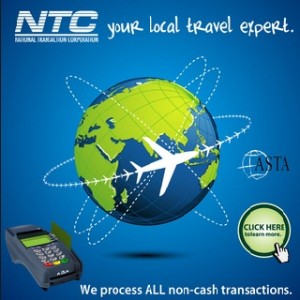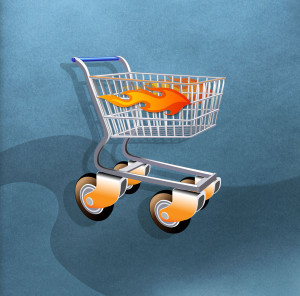June 5th, 2015 by Elma Jane

Traditionally, travel-related merchants have a difficult time obtaining merchant accounts. National Transaction Corporation (NTC) is a full service merchant account provider with extensive experience in the travel arena and related markets, servicing thousands of travel-related merchant accounts by specializing in non-cash electronic transactions. Our services include processing credit card transactions, gift card transactions, and e-commerce transactions, among others. We offer a full line of products including credit card terminals, cellular devices, supplies, and accessories for each model sold. We offer aggressive rates and pricing for mail/telephone order, retail/restaurant, wireless, and online transactions while specializing in the travel and high volume sectors of merchant processing, and we are proud to be the preferred merchant provider for ASTA.
NTC is dedicated to providing the highest caliber of service and solutions in the merchant processing industry. We actually answer the phone when you need assistance! NTC has a team of dedicated employees providing personalized service to each account holder and are available directly through their toll free number, never hidden behind a menu system. Our excellent service truly separates us from everyone else in the industry. The principals of NTC have extensive experience in the processing arena for over 25 years, with experience in all facets of operation, including credit cards, credit initiation, credit investigation, loss prevention, deployment, and customer and terminal support. We employ internal sales associates as well as independent sales agents who offer many opportunities through their referral reward services and Independent Sales Organization (ISO) programs.
NTC’s online gateway allows for processing transactions, reviewing account history, and interacting with various shopping cart and accounting applications such as QuickBooks, Peachtree, and many other titles. Reservation software such as Trams are compatible and integrate well with all National Transaction merchant accounts. Whether you are a travel agency or an independent agent, we offer many solutions that cater to the travel industry and will increase your revenue with quicker deposits into your bank account.
Travel environments are unique in that your transactions are usually keyed; there is almost always a delayed delivery period, and large ticket transactions are not uncommon since one card holder may be paying for multiple tickets. They also tend to be seasonal, with peak season months generating an unusual spike in their “average” monthly volume, and charge-back’s pose a potential threat by travelers who are unable to complete their trip. Combine even a few of these factors together and you have cause for a reserve, or even account termination. National Transaction Corp specializes in understanding what makes your transactions unique, as a travel agent, and how they affect your merchant account.
The importance of customer service is something that is over looked when merchants compare the overall cost of monthly fees with their merchant account. That is, until the moment they need assistance with their account. Whether searching for missing deposits, having problems processing transactions, issuing refunds, processing voids, or questioning their billing statement, a merchant should always remember you get what you pay for. If you wonder why they can offer you no monthly fee, they are offering you no LIVE customer support. Customer support for them will come via means of email. You will wait hours for answers, and even days for a simple confirmation or general email, let alone a resolution.
National Transaction Corporation has over 17 years of dedication and experience in providing quality solutions in the credit card processing arena. From internet e-commerce applications to food stamp processing, from small start up businesses to fortune 500 companies, NTC has a complete product selection to customize a solution to grow with your business. We at NTC pride ourselves on being a full service, member service provider. It is our mission to provide the same dedication and service in maintaining your business as you experience in us earning your business. NTC will provide service after the sale. It is that service that sets us apart! For more information, contact NTC for world class service and solutions.
Contact National Transaction Corporation today at 888-996-2273 to see how we can help you with your travel merchant account, or visit us online at www.nationaltransaction.com for more information.
by Elizabeth Cody (Travel Research Online)
Posted in Best Practices for Merchants, Credit card Processing, e-commerce & m-commerce, Gift & Loyalty Card Processing, Merchant Account Services News Articles, Merchant Cash Advance, Travel Agency Agents Tagged with: ASTA, bank account, billing statement, credit card terminals, credit card transactions, credit cards, customer service, deposits, e-commerce, e-commerce transactions, electronic transactions, gift card transactions, Independent Sales Organization, ISO, merchant account provider, merchant accounts, merchants, service provider, travel, travel agency, travel agent, travel industry
September 26th, 2013 by Elma Jane
5 Effective and Unusual Ecommerce Pricing Strategies
Most online retailers set pricing using the cost-plus or the value-based method. While these work well, there are several other ways to price products. Here are the five effective and unusual ways to price products on your ecommerce site.
1. Name your Price
This is a variation of the PWYW model, where the price has to exceed a threshold to get the product. This threshold price is not shown to shoppers to allow them to name their own price. This model has been successfully used in the travel industry, among others, where availability of airlines, hotels, and travel dates is based on the named price. This strategy can also work well for online retailers that are selling the following types of products.
Defined Price Ranges – Gifts site where NYP can be a guide to show products that are within that price range. NYP can be used as a guided selling tool to show gifts within a defined price range. The retailers can use price discrimination in combination with this strategy to increase their profits.
High Perceived Value – The perceived value of the product is much higher than the cost of procuring it, prompting the consumers to name a higher price. This can apply to books, music, and food products.
Imprecise Value – The products can be sold at a wide range of prices and still generate a profit. This could include one-of-a-kind products or art, where it is difficult to assess the value.
2. Pay What You Want
The pay-what-you-want strategy — PWYW — has been around for a while but has not been used heavily in the online retail space. A well-publicized offline success is Panera Bread restaurants, which has used this pricing strategy in a few of its restaurants. In the online world, Humble Bundle a music and game store has been using this too. In almost all cases, this strategy did not result in a significant profit or loss but led to a lot of free marketing. That is one of the big reasons for adopting this strategy in retail. There are several types of online retailers that can benefit.
Limited Categories – This strategy does not need to be implemented for your complete online store. It can be limited to a few products or a few categories that are the best fit.
Link to Charities – If your site shares revenue with charities, then PWYW can work, as customers often pay more to help the charity, increasing your share of the revenue in the process.
Offer an Incentive – You can also tie the PWYW strategy with an incentive…such as an additional product once the price exceeds a certain threshold, say $10. This threshold can be kept secret or made public on the site as a marketing tactic to encourage customers to pay more.
Proper Customers – If you believe that your customers are fair-minded and understand the value of your products, then PWYW might be effective.
3. Personalized Pricing
This is a relatively new strategy where specialized yield management algorithms are used to personalize the price offered to each visitor. With the rise of Big Data, most of the personalized pricing is done in real-time by analyzing a variety of factors like customer loyalty, device used by the shopper, customer preferences, history of purchases, and so on. This strategy is best suited for the following types of online retailers.
New Products Regularly – There are many products in the online store, with new products introduced regularly. This makes personalized pricing more effective as repeat customers see the new product and the new promotional pricing to reward their loyalty, or to encourage a first purchase for new ones.
Repeat Customers – Customers know that they will be rewarded with personalized pricing and promotions based on the loyalty to your site.
Wide Profit Margins – Products are sold with good margins, allowing the retailer to offer discounts at any time. For example if the product is sitting in a shopper’s cart for a few days, the retailer might offer a discount or drop the price to encourage the shopper to complete the purchase.
4. Flat Pricing
Flat pricing is a strategy where a limited number of prices are used for all product offerings, such as in dollar stores where every product is priced at one dollar. This strategy works well in the following situations.
Many Similar Products – Your site sells a wide variety of products that are priced nearly the same. In this scenario, flat pricing is simpler to manage, easier for consumers, and also results in greater profit.
Subscription Pricing – A new trend in online retail is subscription pricing, where customers can sign up for a flat price of, say, $25, $49, or $99 to receive a set of products every month.
5. Free
Several software companies are using free pricing successfully where the software is given away for free and customer is charged either for support or for premium features. A free pricing strategy can be an effective strategy for ecommerce merchants to attract customers by following the following guidelines.
Basic vs. Premium Versions – This strategy can be effective if the basic version is free and the customer pays for a premium version. The life insurance industry uses this approach, where a basic $10,000 insurance is often free. If even a small percentage of customers buy the premium offering, the insurer makes a profit.
Emphasize Consumables – Products that have durable and consumable components can benefit from a free pricing strategy, if customers can only buy both pieces from your site. For example, Gillette sometimes offers shaving razors for free since only Gillette shaving blades will work with its razors. On the other hand, it does not make sense to give away a laser printer for free because the printer paper and toner can be bought from anywhere.
Loss Leader – Use this strategy to offer products for free using the loss leader model. Customers come to the site to get the free products and once they are on the site, you can up-sell or cross-sell them other products.
Seasonal Products – If your site sells seasonal products, then this strategy can drive traffic. For example, a retailer could give away free U.S. flags during the July 4th holiday to generate traffic, while also pushing other non-free July 4th merchandise.
Posted in e-commerce & m-commerce, Electronic Payments, Travel Agency Agents Tagged with: Airlines, e-commerce, hotel, online store, pricing, subscription, travel industry

